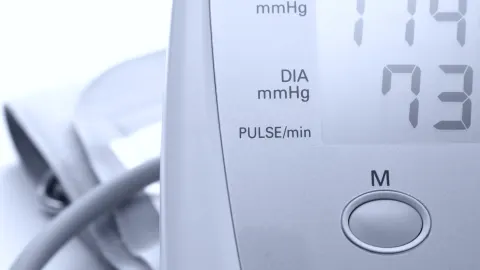Hypertension
- What is hypertension?
- What are the types of hypertension?
- What are the signs and symptoms of hypertension?
- What causes hypertension?
- What are the risk factors for hypertension?
- What are the stages of hypertension?
- When should you see a healthcare provider?
- What are the possible complications of hypertension?
- How is hypertension diagnosed?
- How is hypertension treated?
- Can you prevent hypertension?
- What is the outlook for hypertension?
- Living with hypertension
- Featured hypertension articles
Introduction
Close to half of all adults in the United States have high blood pressure, known clinically as hypertension. A leading cause of premature death worldwide, hypertension occurs when the force of blood flowing against artery walls is consistently too high. This makes the heart pump harder to circulate blood throughout the body.
Over time, hypertension can damage blood vessels and lead to serious issues like heart attack and stroke. It can be managed through lifestyle choices and medication, though its symptoms are often difficult to detect.
Learn about the possible signs and symptoms of hypertension, why it occurs, when to seek medical help, and what steps you can take to lower your blood pressure and achieve your best heart health.
What is hypertension?

Arteries are blood vessels that transport blood from your heart to other parts of your body. When your heart pumps blood, the amount of force placed on the inside of the artery walls is called blood pressure.
Blood pressure naturally rises and falls with each heartbeat. When your heart beats to pump blood through the body, the pressure against the artery walls rises. When your heart relaxes between beats, your blood pressure naturally falls.
Your blood pressure also varies throughout a typical day. For instance, it usually starts to rise a few hours before you wake up, peaks at midday, then drops in the late afternoon or evening. Factors like exercising, stress, and even drinking coffee can elevate blood pressure. Hypertension isn’t simply a routine rise in blood pressure, however. It’s blood pressure that’s consistently too high and can potentially lead to dangerous complications.
Two figures are used to measure blood pressure:
- Systolic blood pressure: This is the first (or top) number in a blood pressure reading. It refers to the pressure in arteries when the heart contracts and pumps blood throughout the body.
- Diastolic blood pressure: This is the second (or bottom) number in a blood pressure reading. It refers to the amount of pressure in between beats when the heart is at rest and filling with blood.
Healthcare providers (HCPs) measure these readings in millimeters of mercury (mm Hg).
According to guidelines released in 2017 from the American Heart Association (AHA) and the American College of Cardiology (ACC), hypertension is defined as blood pressure that is frequently at or above 130/80 mm Hg. This means a person’s systolic blood pressure is 130 and their diastolic blood pressure is 80. An HCP would typically call this “130 over 80.”
Some HCPs instead refer to the Seventh Report of the Joint National Committee on Prevention, Detection, Evaluation, and Treatment of High Blood Pressure’s guidelines from 2003, which define hypertension as blood pressure that’s 140/90 mm Hg or higher. Your HCP can determine your appropriate blood pressure target based on individual factors such as your age and overall health.
Healthy blood pressure is largely considered to be less than 120/80 mm Hg for most adults. Your blood pressure may be too low if it’s below 90/60 mm Hg.
What are the types of hypertension?
There are two main types of hypertension:
- Primary hypertension: Also known as essential or idiopathic hypertension, primary hypertension is the most common type of high blood pressure. Why primary hypertension occurs is not fully known, but it tends to occur over time with age.
- Secondary hypertension: This type of high blood pressure is caused by another medical condition, such as sleep apnea or polycystic ovary syndrome, or by taking certain medications like nonsteroidal anti-inflammatory drugs (NSAIDs). It typically improves after treating the underlying medical condition or stopping the medication in question.
What are the signs and symptoms of hypertension?

Hypertension is sometimes called the “silent killer” since it typically doesn’t cause noticeable signs or symptoms. Around 46 percent of adults with hypertension are unaware they have it, according to the World Health Organization.
Some people with very high blood pressure (around 180/120 mm Hg or higher) may experience symptoms like:
- Chest pain
- Trouble breathing
- Intense headaches
- Dizziness
- Nausea or vomiting
- Anxiety
- Confusion
- Changes in vision
- Nosebleeds
- Arrhythmia (abnormal heartbeat or rhythm)
- Ringing or buzzing in the ears
Because the symptoms of hypertension can be vague or absent entirely, it’s important to regularly visit an HCP who can measure your blood pressure and assess your risk for hypertension and related health concerns like heart disease. Everyone older than 3 should get their blood pressure checked by an HCP at least once every year, according to the National Heart, Lung, and Blood Institute (NHLBI).
Depending on factors such as your age and overall health, your HCP may recommend you use a home blood pressure device to monitor your levels between healthcare visits. You can also take advantage of free blood pressure machines located in many pharmacies and grocery stores.
Measuring your blood pressure is simple, quick, and painless, and your HCP can provide helpful tips on how to use a public or home blood pressure device. They can also gauge the accuracy of your device by comparing results produced by your blood pressure machine and the one at their clinic.
What causes hypertension?
The causes of hypertension vary according to type and can differ from person to person.
Primary hypertension causes
In most cases, there’s no identifiable cause of primary hypertension. It usually develops slowly as a person grows older. Factors like experiencing stress, not getting enough physical activity, or eating too much salt can increase the likelihood of experiencing primary hypertension.
Secondary hypertension causes
Secondary hypertension is caused by something else, such as an underlying medical condition or certain medications. Conditions commonly associated with high blood pressure include:
- Kidney disease
- Atherosclerosis (plaque buildup in the arteries)
- Adrenal gland tumors
- Obstructive sleep apnea (OSA)
- Thyroid problems
- Congenital heart defects
- Obesity
- Diabetes
Drug-induced hypertension is considered a type of secondary hypertension. In addition to NSAIDs like aspirin and ibuprofen, other medications, drugs, and supplements that can raise blood pressure include:
- Acetaminophen
- Decongestants with phenylephrine or pseudoephedrine
- Erythropoietin (often used to help treat anemia and maintain a healthy number of red blood cells)
- Antidepressants such as bupropion, desipramine, and venlafaxine
- Angiogenesis inhibitors (often used to treat cancer) like monoclonal antibodies and tyrosine kinase inhibitors
- Corticosteroids
- Birth control pills containing estrogen
- Immunosuppressants like cyclosporine
- Nicotine
- Attention deficit/hyperactivity disorder (ADHD) medicines such as methylphenidate, amphetamine, dexmethylphenidate, and dextroamphetamine
- Atypical (second-generation) antipsychotics such as clozapine and olanzapine
- Herbal supplements such as St. John’s wort, ephedra, and yohimbine
Pregnancy is another cause of secondary hypertension. This may be referred to as pregnancy-induced hypertension.
Drinking alcohol in excess or using recreational drugs like cocaine, methylenedioxymethamphetamine (MDMA, commonly called ecstasy or Molly), and methamphetamines also increases blood pressure and can cause heart issues.
“White coat” hypertension is a curious type of high blood pressure that only occurs in medical settings. People with white coat hypertension usually have healthy blood pressure at home but display elevated levels when visiting an HCP. An estimated 10 to 30 percent of people with high blood pressure readings have white coat hypertension.
What are the risk factors for hypertension?
Hypertension is associated with a wide range of risk factors that can increase your chances of developing high blood pressure. These include:
- Age: Hypertension can occur at any age, but it’s most common in people who are older than 55. This is often due to the gradual loss of blood vessel elasticity with age.
- Family history: High blood pressure tends to run among closely related blood relatives (such as parents, siblings, and children). Several genes are linked to a small increase in hypertension risk.
- Race: Hypertension is especially common in Black people and tends to develop earlier in adulthood.
- Diet: Drinking too much alcohol or caffeine, consuming large amounts of sodium (found in salt), and not eating enough potassium (found in many fruits and vegetables) are all linked to an increased risk of hypertension.
- Lack of physical activity: While exercise can temporarily raise blood pressure, living a sedentary lifestyle increases your risk of hypertension over time.
- Sex assigned at birth: People assigned male at birth are more likely to develop high blood pressure before age 64. After age 65, hypertension is more common in people assigned female at birth.
- Weight: Hypertension occurs more often in people who are overweight or obese, as do related issues like heart disease and diabetes.
- Tobacco use: Using tobacco products—whether smoking, vaping, or chewing tobacco—temporarily spikes blood pressure and damages artery walls.
- Stress: Chronic stress or engaging in stress-related behaviors like drinking heavily or smoking can raise blood pressure and lead to hypertension.
An increasing amount of research shows social and economic factors may also play a role in hypertension risk. For example, people who have a low income or work night shifts appear to have a greater risk of developing hypertension. Some research also links the experience of being subjected to racism and discrimination to an elevated risk of high blood pressure.
High blood pressure is also more common in certain parts of the country than others. While hypertension is a nationwide issue, the Centers for Disease Control and Prevention (CDC) has found that counties with the greatest concentrations of people with hypertension (from 2018 to 2020) are primarily located in:
- Mississippi
- Louisiana
- Arkansas
- Oklahoma
- Texas
- Kentucky
- Tennessee
- Alabama
- Georgia
- South Carolina
What are the stages of hypertension?
The staging criteria for hypertension can vary. In the U.S., many organizations adhere to the following guidelines:
- Normal blood pressure: Less than 120 mm Hg systolic and less than 80 mm Hg diastolic
- Elevated blood pressure: 120 to 129 mm Hg systolic and less than 80 mm Hg diastolic
- Stage 1 hypertension: 130 to 139 mm Hg systolic or 80 to 89 mm Hg diastolic
- Stage 2 hypertension: Greater than 140 mm Hg systolic or greater than 90 mm Hg diastolic
- Hypertensive crisis (seek immediate medical care): Greater than 180 mm Hg systolic and/or greater than 120 mm Hg diastolic
When should you see a healthcare provider?
It’s important to promptly speak with your HCP if you notice any signs or symptoms of hypertension, even if you aren’t sure that your blood pressure is high. If you do have access to a blood pressure monitor, call 911 if your reading is at or above 180/120 mm HG and you’re experiencing any of the following symptoms. This is known as a hypertensive emergency.
- Chest or upper abdominal pain, which may feel like pressure, squeezing, or tightness
- Back pain
- Shortness of breath
- Trouble speaking
- Changes in vision
- Weakness or numbness
- Severe headache
If you don’t have symptoms of a hypertensive emergency but your blood pressure reading unexpectedly exceeds 180/120 mm Hg, wait five minutes and try again. If your reading remains the same, promptly seek medical care. This is known as hypertensive urgency.
With these recommendations in mind, delaying medical care until your blood pressure reaches potentially life-threatening levels is never a good idea. If your blood pressure is consistently 120/80 mm Hg or higher, be sure to consult with your HCP about ways to lower your blood pressure and stay healthy.
What are the possible complications of hypertension?
If poorly managed or left untreated, excess strain placed on artery walls from hypertension can harden the vessels, limiting the flow of blood and oxygen to the heart and causing damage to other vital organs throughout the body. This may lead to a wide range of serious complications, including but not limited to:
- Aneurysm: An unusual swelling or bulge in a blood vessel wall that can rupture and cause internal bleeding or stroke.
- Kidney disease: An inability of the kidneys to filter blood, which can result in kidney failure.
- Heart attack: A lack of oxygen to the heart that results from a blockage of blood flow.
- Heart failure: A chronic (long-term) condition in which the heart doesn’t pump enough oxygen-rich blood to meet the body’s needs.
- Stroke: A blockage of blood supply to the brain that can result in brain damage.
- Eye damage: Damage to the eye’s retina (retinopathy) due to an extended period of high blood pressure.
- Vascular dementia: A decline in cognitive ability due to brain damage from problems that reduce blood flow to the brain.
- Peripheral artery disease: A condition in which narrowed blood vessels decrease blood flow to the arms and legs.
- Coronary artery disease: Damage to the arteries that supply blood to the heart. This is the most common type of heart disease.
- Preeclampsia: A potentially serious pregnancy complication that occurs when blood pressure becomes too high.
How is hypertension diagnosed?
An HCP may diagnose you with hypertension if you have at least two high blood pressure readings at separate healthcare visits. Other factors such as your medical history, eating patterns, stress levels, and overall health may also factor into a hypertension diagnosis.
Since hypertension usually doesn’t cause symptoms, it’s recommended that you visit an HCP for a regular health screening at least once each year. A blood pressure test is a routine part of most medical visits, and it’s a quick and safe procedure.
You’ll start with your arm supported on a flat surface, such as on a table or the arm of a chair, so that your upper arm rests at heart level. Next, your HCP will place a blood pressure cuff around your arm just above your elbow. They will then gradually inflate the cuff to temporarily impede blood flow in the brachial artery, which runs along the inside of the upper arm. The cuff is then slowly deflated, and blood pressure is recorded using an electronic sensor, stethoscope, or gauge.
Measuring blood pressure is a simple process, but there are a few tips to help ensure you receive an accurate blood pressure reading at your next healthcare visit:
- Use the bathroom before the test.
- Avoid drinking caffeine, exercising, or smoking 30 minutes before the test.
- Don’t cross your legs and make sure your feet are flat on the floor (or supported on a stool, if your feet don’t touch the ground).
- Try to relax.
- Avoid talking during the test.
- Wear a short-sleeved shirt or an easily removable jacket to make sure your arm is uncovered for the test.
Other diagnostic tests for hypertension
If you’re diagnosed with hypertension, your HCP will likely perform additional tests to screen for an underlying cause and possible complications. This might involve blood or urine tests that check cholesterol and blood sugar levels as well as thyroid, liver, and kidney function.
Other testing methods your HCP may recommend include:
- Electrocardiogram (ECG or EKG): This simple test measures your heart’s electrical activity and heartbeat. It involves wearing sensors that send information to a machine that displays results.
- Echocardiogram: This imaging test uses sound waves to visualize how blood flows through the heart and its valves.
- Ambulatory monitoring: This involves wearing a continuous blood pressure monitoring device outside of your HCP’s office for six to 24 hours at a time. It’s sometimes used to rule out white coat hypertension or “masked hypertension,” which occurs when blood pressure is higher outside of medical settings.
- Home monitoring: You may be asked to routinely check your blood pressure at home using a traditional, cuff-style bicep monitor. This can provide more information about your blood pressure patterns and help gauge the effectiveness of hypertension treatment.
How is hypertension treated?

Treatment for hypertension usually involves a combination of heart-healthy lifestyle modifications and medication. In cases of secondary hypertension, treatment may focus on addressing the underlying medical condition, or stopping or adjusting the dosage of medication that’s causing the high blood pressure.
Lifestyle changes for high blood pressure
Making heart-healthy lifestyle modifications is essential for anyone with high blood pressure. In fact, it’s the only treatment necessary for about one in five adults with hypertension. Some general guidelines for lowering blood pressure and improving heart health include:
Make smart diet choices
Eating less sodium and more potassium-rich vegetables and fruits can help lower blood pressure. The Dietary Approaches to Stop Hypertension (DASH) diet is a great example of a heart-healthy eating plan. Following this diet involves consuming plenty of:
- Fruits, like bananas, berries, and avocados
- Vegetables such as sweet potatoes, beets, collard greens, kale, and other leafy greens
- Whole grains, such as oatmeal
- Low-fat dairy products
- Seeds, legumes, and unsalted nuts
These foods are naturally low in sodium and high in heart-healthy nutrients like potassium, magnesium, calcium, and fiber.
The DASH diet also involves cutting back on foods and beverages that are likely to raise blood pressure, including:
- Foods and drinks with added sugars, such as candy, baked goods, soda, and other sugar-sweetened beverages
- Coconut oil, palm oil, and other oils that are solid at room temperature
- Red meat, skin-on poultry, and cured and processed meats like salami, sausages, and hot dogs
- Full-fat dairy products like whole milk, heavy cream, and butter
Finally, the AHA recommends consuming no more than 2,300 milligrams (mg) of sodium per day, with the ideal limit being 1,500 mg per day for most adults. (On average, adults in the U.S. consume more than 3,400 mg of sodium every day.)
Sodium isn’t just found in saltshakers and snacks like chips, pretzels, and popcorn—it can crop up in a range of foods that may not taste salty. A diet that emphasizes packaged and processed foods can contribute to or worsen hypertension. Foods to watch out for include:
- Fast food
- Deli meat
- Dried soup mixes
- Canned vegetables, chillis, and soups
- Frozen pizzas, burritos, and other entrees
- Many natural and processed cheeses
- Buttermilk
- Quick bread, pancake, and waffle mixes
Your HCP can provide you with more information about the DASH diet and other ways you can lower your blood pressure through heart-healthy nutrition.
Increase physical activity
Improved blood pressure is just one of the many benefits of regular exercise. The CDC and AHA encourage adults to get at least:
- 150 minutes of moderate-intensity aerobic activity every week, preferably spread out throughout the week, or
- 75 minutes of vigorous-intensity aerobic activity each week, or
- An equal mix of moderate and vigorous activity each week
- Two sessions a week of muscle-strengthening activities. Be sure to work out each of the major muscle groups, including the legs, hips, back, chest, abdomen, shoulders, and arms.
Brisk walking, water aerobics, and tennis are examples of moderate-intensity aerobic activity, whereas running, swimming laps, and biking fast or uphill are examples of vigorous-intensity aerobic activity. Examples of muscle-building exercises include lifting weights, working with resistance bands, performing bodyweight exercises (like pushups, planks, and squats), and doing some types of yoga such as Ashtanga, Vinyasa flow, and yoga with weights.
Start off slowly and gradually increase the duration, intensity, and pace of your workouts. If you haven’t been active in a while or have any questions or concerns, be sure to talk with your HCP before you start your fitness program. You may also want to consult with a certified personal trainer or clinical exercise physiologist with experience working with clients who have chronic health conditions such as hypertension.
Do what you can. Remember, even a little physical activity is better than none.
Achieve an optimal weight
Adults who are overweight or obese can lower their blood pressure by losing just 3 to 5 percent of their body weight, according to the NHLBI. Combine exercise with a heart-healthy diet to shed excess pounds, control blood pressure, and improve your overall health. Your HCP can suggest a healthy goal weight based on your age, height, and other factors.
Manage stress
Stress is a part of life, but it doesn’t have to spike your blood pressure levels. Finding ways to manage your stress can improve your heart health as well as your overall well-being. Consider trying relaxation techniques like practicing deep breathing, spending more time doing hobbies you enjoy, or speaking with a licensed mental health provider about stressors in your life. This can help keep stress—and your blood pressure—in check.
Quit smoking and limit alcohol
Quitting smoking is essential to achieving healthy blood pressure. And because drinking alcohol in excess can contribute to hypertension, you may need to reduce your intake or quit altogether. Talk to your HCP about how much you typically drink in a week and whether consuming less alcohol could improve your blood pressure.
Get enough high-quality sleep
Not getting enough high-quality sleep is associated with a wide range of health issues, including hypertension. Adults should aim for seven to nine hours of sleep every night. Practice healthy sleep habits like maintaining a consistent sleep schedule and develop a relaxing bedtime routine to help you improve the quality of your sleep and feel more rested when you wake up.
Medication for hypertension
Medication is recommended for around four out of five adults with hypertension. The most effective and commonly prescribed types of medication for high blood pressure include:
- Angiotensin-converting enzyme (ACE) inhibitors: Benazepril, lisinopril, captopril, and other ACE inhibitors help keep blood vessels relaxed and opened by preventing the formation of natural chemicals that narrow vessels.
- Angiotensin II receptor blockers (ARBs): Drugs like candesartan and losartan also prevent blood vessel narrowing by stopping chemicals that constrict vessels.
- Calcium channel blockers: These drugs relax blood vessels by blocking calcium from entering the vessels and heart muscle. Commonly prescribed calcium channel blockers include amlodipine and diltiazem.
- Diuretics: Also known as water pills, diuretics like chlorthalidone and hydrochlorothiazide help lower blood pressure by flushing excess fluids and sodium out of the body. They’re often combined with other blood pressure medications.
It’s important to take hypertension medication as prescribed and promptly report any unexpected side effects or concerns to your HCP. Based on your needs, your HCP may adjust your dosage or recommend a different combination of medications.
Other drugs, including beta blockers and alpha blockers, may be prescribed if your hypertension doesn’t improve with these first-line medications.
Can you prevent hypertension?
Hypertension is preventable, even for people who have multiple risk factors for the condition. Preventing and treating high blood pressure both require following a heart-healthy lifestyle, which involves:
- Reducing sodium intake and eating more blood pressure-friendly foods
- Exercising regularly
- Maintaining a healthy weight
- Managing stress well
- Quitting smoking
- Limiting or avoiding alcohol
- Getting enough restful sleep
To learn more about hypertension prevention strategies and what approaches may be best for you, talk to your HCP.
What is the outlook for hypertension?
Poorly managed or untreated hypertension can be deadly. Hypertension was a primary or contributing cause of more than 690,000 deaths in the U.S. in 2021, according to the CDC. Only around one in four adults with hypertension has their blood pressure under control.
Despite the statistics, hypertension is manageable and preventable with healthy lifestyle choices. Taking medication prescribed by your HCP can also help you control hypertension and prevent dangerous complications.
Living with hypertension

Simple habits like exercising regularly and opting for low-sodium foods can make a big difference in your health if you have hypertension. It’s also important to regularly check your blood pressure, attend all recommended healthcare appointments, and carefully follow your HCP’s hypertension treatment guidance—including taking all medications as prescribed. Techniques like setting a reminder on your phone or computer can help ensure you don’t forget to take your blood pressure medication if your day gets busy.
With support from your healthcare team and maintaining some blood-pressure-managing habits, you can live well with hypertension. Your HCP is your best resource if you have any questions about your condition or how you can improve your blood pressure and overall health.
Featured hypertension articles

American Heart Association. Getting More Exercise Than Guidelines Suggest May Further Lower Death Risk. Published July 25, 2022.
American Heart Association. How Much Sodium Should I Eat Per Day? Last reviewed November 1, 2021.
American Heart Association. Hypertensive Crisis: When You Should Call 911 for High Blood Pressure. Last reviewed May 31, 2023.
American Heart Association. Monitoring Your Blood Pressure at Home. Last reviewed May 30, 2023.
American Heart Association. What Exercise Is Right for Me? Accessed August 1, 2023.
Centers for Disease Control and Prevention. Facts About Hypertension. Last reviewed July 6, 2023.
Centers for Disease Control and Prevention. High Blood Pressure Symptoms and Causes. Last reviewed May 18, 2021.
Centers for Disease Control and Prevention. Physical Activity – Adults. Last reviewed June 2, 2022.
Cleveland Clinic. 24-Hour Ambulatory Blood Pressure Monitoring. Last reviewed March 6, 2023.
Cleveland Clinic. DASH Diet: What Is It, Meal Plans and Recipes. Published June 18, 2021.
Cleveland Clinic. High Blood Pressure (Hypertension). Last reviewed May 1, 2023.
Hegde S, Ahmed I, Aeddula NR. Secondary Hypertension. StatPearls [Internet]. Last updated January 28, 2023.
Mayo Clinic. Blood Pressure: Does it Have a Daily Pattern? Last reviewed June 22, 2022.
Mayo Clinic. High Blood Pressure (Hypertension). Last reviewed September 15, 2022.
MedlinePlus. High Blood Pressure. National Library of Medicine. Last updated November 20, 2020.
Million Hearts. Estimated Hypertension Prevalence, Treatment, and Control Among U.S. Adults. Last reviewed May 12, 2023.
National Council on Aging. 10 Foods That Help Lower Blood Pressure Naturally. Published May 7, 2022.
National Heart, Lung, and Blood Institute. High Blood Pressure Causes and Risk Factors. Last updated March 24, 2022.
National Heart, Lung, and Blood Institute. High Blood Pressure Diagnosis. Last updated March 24, 2022.
National Heart, Lung, and Blood Institute. High Blood Pressure Symptoms. Last updated March 24, 2022.
National Heart, Lung, and Blood Institute. Living With High Blood Pressure. Last updated March 24, 2022.
National Heart, Lung, and Blood Institute. Low Blood Pressure. Last updated March 24, 2022.
National Heart, Lung, and Blood Institute. What is High Blood Pressure? Last updated March 24, 2022.
World Health Organization. Hypertension. Last reviewed March 16, 2023.





